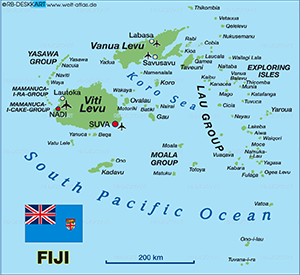|
|||
|
|
|
|
Flash Flood Guidance System for Fiji (FijiFFGS)

Flash floods are a very significant hazard worldwide, causing the highest number of deaths per number of people affected. Natural flash floods are caused by intense rainfall from slow moving thunderstorms and tropical cyclones, rainfall over hills and mountains, condition of the soil and surrounding environment, and sudden release of impounded water from natural dam. Flash floods are hydro-meteorological events and require meteorology and hydrology expertise. In Fiji, flash floods are common hazardous events that pose a serious threat to populations. In recent years, floods and landslides have claimed lives of people, damages to properties and infrastructure, putting back decades of development, and disruption to business and livelihoods. In February 2017, parts of the Nadi area were under water as continual heavy rain created multiple flash flooding events. In April of 2018, tropical cyclone “Josie” brought torrential weekend rains and flooding in the town of Ba on the island of Viti Levu, causing four fatalities, and another presumed drowned. Fiji FFGS is funded by the Climate Risk Early Warning System (CREWS) Initiative and Environment and Climate Change Canada (ECCC), and implemented by the World Meteorological Organization (WMO) and the Hydrological Research Center (HRC). It uses the best science of meteorology and hydrology to further improve the quality and lead-time for early warning of flash flooding. The Flash Flood Guidance System will supplement existing systems for monitoring and early warning for floods in the Fiji Islands. The FijiFFGS will provide guidance to the Fiji Meteorological Service’s weather experts to generate and issue operational flash flood forecasts and warnings with improved lead-time and sites’ specific.
FijiFFGS Initial Planning Meeting and Collaboration Visit for Radar Data Ingestion, November 2018, Nadi, Fiji
The FijiFFGS Initial planning meeting was held at the Fiji Meteorological Service (FMS) in Nadi, Fiji on the 12th and 13th of November 2018. In attendance were representatives of the FMS and Disaster Management Office as well as the World Meteorological Organization (WMO) and Hydrologic Research Center (HRC). The meeting provided an overview of the components of the FFGS, discussed and developed a work plan for the implementation of the System, provided simulation training for forecasters and disaster managers, and paved the way for close collaboration between the FMS and the National Disaster Management Office for effective flash flood warning and response for the Fiji Islands. Following the initial planning meeting and on the 15th and 16th of November 2018, a session was held for forecasters and disaster managers on the use of radar data for quantitative flood and flash flood prediction.
PresentationsDay 1
Day 2
FijiFFGS First Steering Committee Meeting, July 2019, Suva, Fiji
PresentationsDay 1
Day 2
Day 3 |
|
|||||||||||
 ©2017 World Meteorological Organization, 7bis, avenue de la Paix, CP No. 2300, CH-1211 Geneva 2, Switzerland - Tel.: +41(0)22 730 81 11 - Fax: +41(0)22 730 81 81 |
|||||||||||||